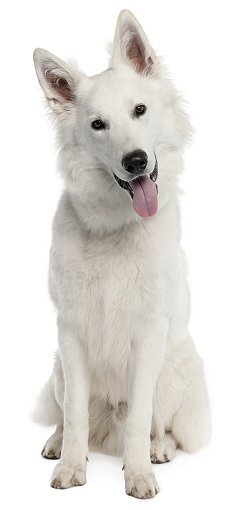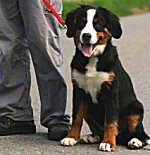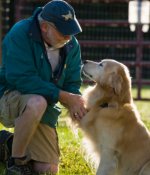White Shepherds: What's Good About 'Em, What's Bad About 'Em
White Shepherd temperament, personality, training, behavior, pros and cons, advice, and information, by Michele Welton, Dog Trainer, Behavioral Consultant, Author of 15 Dog Books

In the United States, there are really three dog breeds that could claim the name White Shepherd.
(1) AKC German Shepherds who happen to be white
The very popular breed that we call a German Shepherd comes in a variety of colors, including white. For several reasons (not necessarily good reasons), white dogs aren't appreciated by the German Shepherd's national breed club nor by German Shepherd breeders who compete at dog shows. Despite their disapproval, a white puppy who pops up in a litter of German Shepherds can still be registered with the American Kennel Club as a German Shepherd.
So if you're considering acquiring an AKC-registered German Shepherd who just happens to be white, you can expect a similar temperament and behavior as if he were a more familiar black and tan color.
(2) UKC White Shepherds
In the United States, instead of registering a white German Shepherd puppy with the American Kennel Club, you might choose to register him with a different association called the United Kennel Club. The UKC offers separate registration to white dogs under their own breed name: White Shepherd.
If you're considering acquiring a UKC-registered White Shepherd, you should find out whether the breeder's goal was to make the temperament of his dogs the same as (or different from ) normal-colored German Shepherds.
White Shepherds are often bred to have a softer, more mellow, more sensitive personality. Because of this sweeter temperament, White Shepherds are seldom used as police dogs, guard dogs, or to participate in protection dog sports such as schutzhund. A White Shepherd can certainly be a very good watchdog, but his "watching" is usually limited to alerting you that someone is coming. White Shepherds are not typically aggressive.
In fact, if a White Shepherd is going to have any temperament fault, it's more likely to be timidity or skittishness. White Shepherds need a great deal of early socialization to build a confident attitude toward strangers and strange situations.
White Shepherds do need plenty of physical and mental exercise. This smart breed should not be relegated to a home that simply wants a casual pet to walk around the block.
White Shepherds can be quite vocal, tending to whine, mumble, and grumble.
Though they seldom have dominant personalities, White Shepherds still need a confident, consistent owner who will establish and enforce rules.
(3) White Swiss Shepherd (aka Berger Blanc Suisse)
Finally, there is another breed, based in Europe and registered with an international association called the FCI. This breed is called the White Swiss Shepherd (Berger Blanc Suisse) and it differs from both AKC German Shepherds and UKC White Shepherds in key areas of appearance, temperament, and health. I'm currently working on an article about that breed.
If you want a dog who...
- Is strong, athletic, and natural-looking
- Has a "softer," more mellow personality than a traditionally-colored German Shepherd
- Thrives on challenging activities and exercise
- Is exceptionally intelligent, loyal, and versatile – when well-socialized and well-trained, can learn and do almost anything
- Makes a sensible watchdog and is not inappropriately hostile
A White Shepherd may be right for you.
If you don't want to deal with...
- Providing plenty of exercise and interesting things to do
- Skittishness or shyness in some lines, or when not extensively socialized
- Destructiveness when bored or not exercised enough
- Potential aggression toward other dogs, especially of the same sex
- Constant heavy shedding
A White Shepherd may not be right for you.
 |
Dog Breed Traits – Which Traits Are Right For You? In this brand new series, I'll help you decide which dog breed traits would best suit you and your family, your home and yard, and your lifestyle, so you can choose the best dog breed for your family. |
Keep in mind that the inheritance of temperament is less predictable than the inheritance of physical traits such as size or shedding. Temperament and behavior are also shaped by raising and training.
FREE eBooks by Michele Welton
![]() "Respect Training for Puppies" and "Teach Your Dog 100 English Words" are free step by step guides to teaching your pup to be calm and well-behaved.
"Respect Training for Puppies" and "Teach Your Dog 100 English Words" are free step by step guides to teaching your pup to be calm and well-behaved.
![]() "11 Things You Must Do Right To Keep Your Dog Healthy and Happy" is a free guide to keeping your dog mentally, physically, and emotionally happy and healthy so you can enjoy a longer lifetime of companionship.
"11 Things You Must Do Right To Keep Your Dog Healthy and Happy" is a free guide to keeping your dog mentally, physically, and emotionally happy and healthy so you can enjoy a longer lifetime of companionship.

- You can avoid some negative traits by choosing an ADULT dog from an animal shelter or rescue group. With an adult dog, you can easily see what you're getting, and plenty of adult White Shepherds have already proven themselves not to have negative characteristics.
- If you want a puppy, you can avoid some negative traits by choosing the right breeder and the right puppy.
More traits and characteristics of the White Shepherd
If I was considering a White Shepherd, I would be most concerned about...
- The range of temperaments. You should know what kind of personality you're looking for before you ever start looking for a White Shepherd. Otherwise you might end up with an individual who is very different than what you can handle. You should be especially cautious with this breed because there are a good number of them with inherited temperament problems such as nervousness and timidity.
- Serious health problems. White Shepherds share a number of health problems with German Shepherds of all colors. Crippling hip and elbow dysplasia, skin diseases, and autoimmune diseases are some examples. Read more about White Shepherd Health.
- Heavy shedding. White Shepherds shed constantly. Longhaired individuals "appear" to shed less because much of their shed hair gets caught in their long wavy outer coat. But you still need to brush it out and you'll be amazed at how much hair this breed can produce. Make sure you're okay with this.
- Socialization requirements. Standoffish by nature, White Shepherds need extensive exposure to people so that their natural caution does not become shyness or fearfulness, which are very difficult to live with. Read more about the importance of careful socialization.
- Providing enough mental stimulation. German Shepherds of all colors are so intelligent and capable. I hate to see them chosen by owners who just want a dog to hang around the house and yard. Shepherds of all colors thrive when you find interesting things for them to do that challenge their minds.
Get your White Shepherd involved in agility (obstacle course), or advanced obedience classes. Play fetch games. Take them hiking. They must have physical outlets for their energy, and mental outlets for their intelligent minds. See my free training book, Teach Your Dog 100 English Words.
- Potential animal aggression. Most White Shepherds are good with other dogs and cats in their own family. But some individuals aren't so tolerant of other dogs of the same sex.
- Legal liabilities. White Shepherds may be lumped in with other German Shepherds for purposes of "banning" in certain areas, or refusal of homeowner insurance policies. In this day and age, the legal liabilities of owning any breed that looks intimidating and has a history as a guardian dog should be considered. People are quicker to sue if such a dog does anything even remotely questionable.
My best-selling books – now available FREE on my website
 Respect Training For Puppies: 30 seconds to a calm, polite, well-behaved puppy is for puppies 2 to 18 months old. Your puppy will learn the 21 skills that all family dogs need to know. Click here to read for free.
Respect Training For Puppies: 30 seconds to a calm, polite, well-behaved puppy is for puppies 2 to 18 months old. Your puppy will learn the 21 skills that all family dogs need to know. Click here to read for free. Teach Your Dog 100 English Words is a unique Vocabulary and Respect Training Program that will teach your adult dog to listen to you and do what you say. Click here to read for free.
Teach Your Dog 100 English Words is a unique Vocabulary and Respect Training Program that will teach your adult dog to listen to you and do what you say. Click here to read for free. 11 Things You Must Do Right To Keep Your Dog Healthy and Happy helps your dog live a longer, healthier life. Get my honest advice about all 11 Things before you bring home your new puppy, because some mistakes with early health care cannot be undone. Click here to read for free.
11 Things You Must Do Right To Keep Your Dog Healthy and Happy helps your dog live a longer, healthier life. Get my honest advice about all 11 Things before you bring home your new puppy, because some mistakes with early health care cannot be undone. Click here to read for free.Related posts you might enjoy






